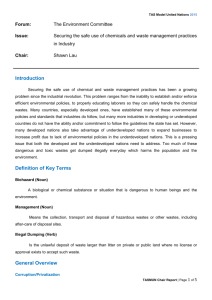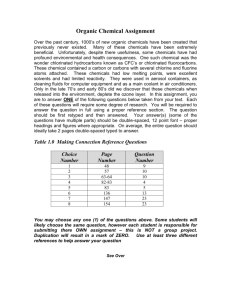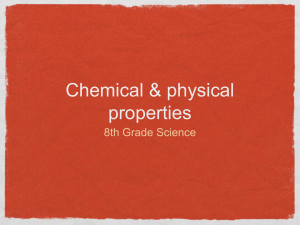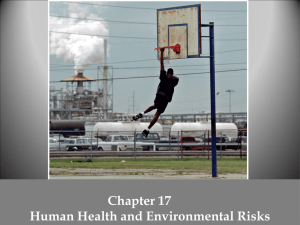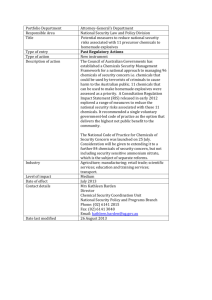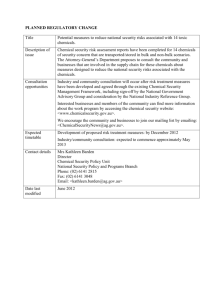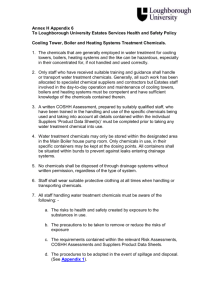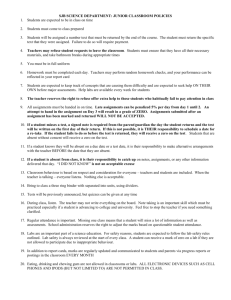NATIONS UNIES - Minamata Convention on Mercury
advertisement
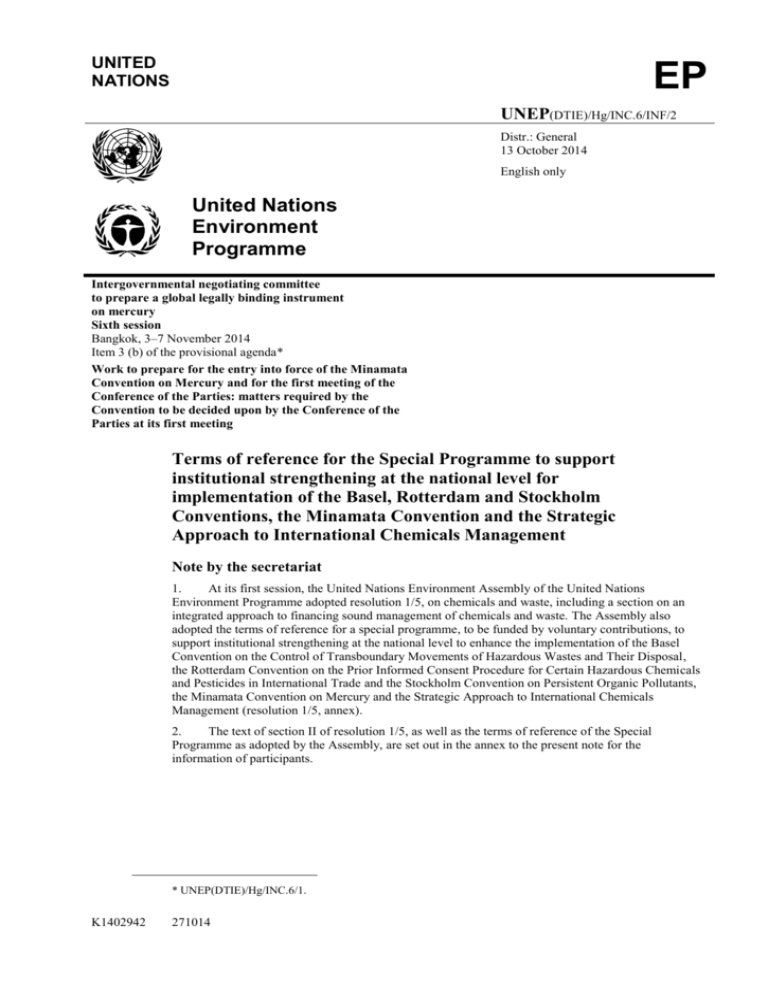
UNITED NATIONS EP UNEP(DTIE)/Hg/INC.6/INF/2 Distr.: General 13 October 2014 English only United Nations Environment Programme Intergovernmental negotiating committee to prepare a global legally binding instrument on mercury Sixth session Bangkok, 3–7 November 2014 Item 3 (b) of the provisional agenda* Work to prepare for the entry into force of the Minamata Convention on Mercury and for the first meeting of the Conference of the Parties: matters required by the Convention to be decided upon by the Conference of the Parties at its first meeting Terms of reference for the Special Programme to support institutional strengthening at the national level for implementation of the Basel, Rotterdam and Stockholm Conventions, the Minamata Convention and the Strategic Approach to International Chemicals Management Note by the secretariat 1. At its first session, the United Nations Environment Assembly of the United Nations Environment Programme adopted resolution 1/5, on chemicals and waste, including a section on an integrated approach to financing sound management of chemicals and waste. The Assembly also adopted the terms of reference for a special programme, to be funded by voluntary contributions, to support institutional strengthening at the national level to enhance the implementation of the Basel Convention on the Control of Transboundary Movements of Hazardous Wastes and Their Disposal, the Rotterdam Convention on the Prior Informed Consent Procedure for Certain Hazardous Chemicals and Pesticides in International Trade and the Stockholm Convention on Persistent Organic Pollutants, the Minamata Convention on Mercury and the Strategic Approach to International Chemicals Management (resolution 1/5, annex). 2. The text of section II of resolution 1/5, as well as the terms of reference of the Special Programme as adopted by the Assembly, are set out in the annex to the present note for the information of participants. * UNEP(DTIE)/Hg/INC.6/1. K1402942 271014 UNEP(DTIE)/Hg/INC.6/INF/2 Annex United Nations Environment Assembly resolution 1/5, on chemicals and waste Section II of resolution 1/5 II Integrated approach to financing sound management of chemicals and waste 5. Welcomes an integrated approach to address the financing of the sound management of chemicals and wastes, and underscores that the three components of an integrated approach, mainstreaming, industry involvement and dedicated external finance, are mutually reinforcing and are all important for the financing of the sound management of chemicals and waste at all levels; 6. Also welcomes the revision of the Instrument made by the Assembly of the Global Environment Facility so as to include a focal area on chemicals and waste, and the increase in resources allocated to chemicals and waste by the sixth replenishment; 7. Adopts the terms of reference for a special programme, annexed to the present resolution, to be funded by voluntary contributions, to support institutional strengthening at the national level to enhance the implementation of the Basel, Rotterdam and Stockholm conventions, the Minamata Convention on Mercury and the Strategic Approach to International Chemicals Management; 8. Requests the Executive Director, consistent with the terms of reference for the Special Programme, to establish and administer the Special Programme trust fund and to provide a secretariat to deliver administrative support to the Programme; 9. Requests the Executive Board of the Special Programme, in the light of the experience of the Programme and the lessons learned by recipient countries, to review the effectiveness of the operational arrangements for the Programme set out in its terms of reference and to provide a report on the review, to be considered by the United Nations Environment Assembly at its third session in 2018, with a view to its making adjustments, if necessary, to the operational arrangements for the Special Programme; 10. Requests the Executive Director to submit the terms of reference for the Special Programme to the conferences of the parties of the Basel, Rotterdam and Stockholm conventions, the Intergovernmental Negotiating Committee of the Minamata Convention on Mercury and the Openended Working Group of the Strategic Approach to International Chemicals Management for their information; 11. Encourages Governments in a position to do so, as well as the private sector, including industry, foundations, other non-governmental organizations and other stakeholders, to mobilize financial resources for the effective establishment and quick start implementation of the Special Programme; Annex to resolution 1/5 Terms of reference for the Special Programme to support institutional strengthening at the national level for implementation of the Basel, Rotterdam and Stockholm conventions, the Minamata Convention and the Strategic Approach to International Chemicals Management Recalling decision 27/12 on chemicals and waste management, part VIII, paragraphs 13 and 14 of the First Universal Session of the Governing Council/Global Ministerial Environment Forum of the United Nations Environment Programme (UNEP): 2 UNEP(DTIE)/Hg/INC.6/INF/2 I. Objective of the Special Programme 1. The objective of the Special Programme is to support country-driven institutional strengthening at the national level, in the context of an integrated approach to address the financing of the sound management of chemicals and wastes, taking into account the national development strategies, plans and priorities of each country, to increase sustainable public institutional capacity for the sound management of chemicals and wastes throughout their life cycle. Institutional strengthening under the Special Programme will facilitate and enable the implementation of the Basel, Rotterdam and Stockholm conventions, the Minamata Convention and the Strategic Approach to International Chemicals Management (hereinafter referred to as “the Instruments”). II. Definition of institutional strengthening 2. For the purposes of the Special Programme, institutional strengthening is defined as enhancing the sustainable institutional capacity of Governments to develop, adopt, monitor and enforce policy, legislation and regulation, as well as to gain access to financial and other resources for effective frameworks for the implementation of the Instruments for the sound management of chemicals and wastes throughout their life cycle. III. Expected outcomes of institutional strengthening through the Special Programme 3. It is expected that strengthened national institutions would have the capacity to do the following: (a) Develop and monitor the implementation of national policies, strategies, programmes and legislation for the sound management of chemicals and wastes; (b) Promote the adoption, monitoring and enforcement of legislation and regulatory frameworks for the sound management of chemicals and wastes; (c) Promote the mainstreaming of the sound management of chemicals and wastes into national development plans, national budgets, policies, legislation and implementation frameworks at all levels, including addressing gaps and avoiding duplication; (d) Work in a multisectoral, effective, efficient, transparent, accountable and sustainable manner in the long term; (e) Facilitate multisectoral and multi-stakeholder cooperation and coordination at the national level; (f) Promote private sector responsibility, accountability and involvement; (g) Promote the effective implementation of the Basel, Rotterdam and Stockholm conventions, the Minamata Convention and the Strategic Approach; (h) Promote cooperative and coordinated implementation of the Instruments at the national level. IV. Scope of the Special Programme 4. The Special Programme should avoid duplication and proliferation of funding mechanisms and associated administration, and should fund activities that fall outside the mandate of the Global Environment Facility. 5. The activities funded under the Special Programme may encompass the following: (a) Identifying national institutional capacity, weaknesses, gaps and needs, as well as strengthening the institutional capacity to do so, where required; (b) Strengthening institutional capacity to plan, develop, undertake, monitor and coordinate the implementation of policies, strategies and national programmes for the sound management of chemicals and wastes; (c) Strengthening institutional capacity to improve progress reporting and performance evaluation capabilities; (d) Promoting an enabling environment to foster the ratification of the Basel, Rotterdam and Stockholm conventions and the Minamata Convention; 3 UNEP(DTIE)/Hg/INC.6/INF/2 (e) Enabling the design and operation of institutional structures dedicated to the promotion of the sound management of chemicals and wastes throughout their life cycle; (f) Strengthening institutional capacity to promote measures to support all aspects of the sound management of chemicals and wastes, including more specific nationally identified thematic areas covered by the Instruments. V. Eligibility for support from the Special Programme 6. Support from the Special Programme will be available for developing countries, taking into account the special needs of least developed countries and small island developing States, and for countries with economies in transition, with priority given to those with least capacity. 7. Applicants will be eligible if they are party to any one of the relevant conventions or have demonstrated that they are in the process of preparing for ratification of any one of the conventions. 8. Applications will include identification of the associated domestic measures to be taken to ensure that the national institutional capacity supported by the Special Programme is sustainable in the long term. VI. Governance arrangements for the Special Programme 9. An Executive Board will be the decision-making body and oversee the Special Programme with the support of a secretariat. 10. The Executive Board will reflect a balance between donors and recipients. The term of the representatives will be in a two-year rotation. The Executive Board will be composed of the following: (a) Four representatives of recipient countries, reflecting equitable, geographical representation, drawn from the following United Nations regions: Africa, Asia-Pacific, Central and Eastern Europe, and Latin America and the Caribbean. In addition, the Executive Board will have one representative from a least developed country or a small island developing State on a rotational basis; (b) Five donor representatives, which are not also recipient countries. 11. The executive secretaries of the Secretariat of the Basel, Rotterdam and Stockholm conventions and the Minamata Convention, the Coordinator of the Strategic Approach and a representative of the secretariat of the Global Environment Facility, as well as representatives of Governments and regional economic integration organizations, any implementing agencies and one representative from each of the Bureaus of the governing bodies of the Instruments may participate, at their own expense, as observers at the meetings of the Executive Board. VII. Mandate and functions of the Executive Board 12. The Executive Board will have two co-chairs, one from recipient countries and one from donor countries. 13. The Executive Board will meet yearly and take its decisions by consensus wherever possible. If consensus cannot be reached, the Executive Board will, as a last resort, take its decisions by a two-thirds majority of its members present and voting. The Executive Board will, as required, further develop its rules of procedure at its first meeting. 14. The Executive Board will take operational decisions regarding the functioning of the Special Programme, including the approval of applications for funding, and will endorse procedures for application, assessment, reporting and evaluation. The Executive Board will provide operational guidance on the implementation of the Special Programme and will provide advice on other matters as required. VIII. Administering organization 15. As the administering organization, UNEP will provide a Special Programme trust fund and a secretariat to deliver administrative support to the Programme, including the allocation of human and other resources. 16. The secretariat will process application proposals for approval by the Executive Board, manage approved allocations and service the Executive Board. The Secretariat will report on its operations to the Executive Board and will be accountable to the Executive Director of UNEP for administrative and financial matters. The secretariat will submit an annual report to the Executive 4 UNEP(DTIE)/Hg/INC.6/INF/2 Board, which will also be sent to the governing bodies of UNEP and of the Instruments for their consideration. IX. Operational arrangements for the Special Programme 17. The Special Programme will receive applications directly from national Governments. It will be easily accessible, simple and effective, and draw on experience from existing support mechanisms as appropriate. 18. Applications should be outlined within the context of an overall country approach to strengthening institutional capacity. The applications should contain proposed measures and performance targets, and information relating to long-term sustainability. 19. Applications should be submitted to the secretariat. The secretariat will appraise applications for consideration and decision by the Executive Board. 20. Cumulative allocations to a country should be decided by the Executive Board, based on the contributions received and the needs expressed in the applications submitted. Of that total, an amount not exceeding 13 per cent may be retained for administrative purposes. 21. Beneficiary countries will contribute resources equal to the value of at least 25 per cent of the total allocation. The Executive Board may reduce that percentage, commensurate with consideration of the specific national circumstances, capacity constraints, gaps and needs of the applicant. 22. Beneficiary countries shall submit annual reports on progress achieved. A final report and financial audit shall be submitted upon completion of each project, which shall include a full accounting of funds used and an evaluation of outcomes, as well as evidence as to whether the performance targets have been met. X. Contributions 23. Contributions will be encouraged from all signatories and parties to the conventions and other Governments with the capacity to do so, as well as from the private sector, including industry, foundations, other non-governmental organizations and other stakeholders. XI. Duration of the Special Programme 24. The Special Programme will be open to receive voluntary contributions and applications for support for seven years from the date it is established. On the basis of a satisfactory review and evaluation, and subject to a recommendation from the Executive Board to the United Nations Environment Assembly, the Special Programme may be eligible for a one-time extension, not to exceed an additional five years. Special Programme funds may be disbursed for a maximum of 10 years from the date the Programme is established, or eight years from the date it is extended, if applicable, at which point the Programme will complete its operations and close. The terms of reference of the above-mentioned review and evaluation are to be decided by the Executive Board. 5

